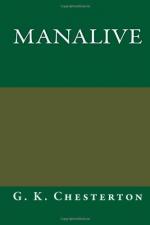“Come, I’ll take each of you in order. Once take Smith outside that gate, and you take him into the front page of the evening papers. I know; I’ve written the front page myself. Miss Duke, do you or your aunt want a sort of notice stuck up over your boarding-house—`Doctors shot here.’? No, no—doctors are rubbish, as I said; but you don’t want the rubbish shot here. Arthur, suppose I am right, or suppose I am wrong. Smith has appeared as an old schoolfellow of yours. Mark my words, if he’s proved guilty, the Organs of Public Opinion will say you introduced him. If he’s proved innocent, they will say you helped to collar him. Rosamund, my dear, suppose I am right or wrong. If he’s proved guilty, they’ll say you engaged your companion to him. If he’s proved innocent, they’ll print that telegram. I know the Organs, damn them.”
He stopped an instant; for this rapid rationalism left him more breathless than had either his theatrical or his real denunciation. But he was plainly in earnest, as well as positive and lucid; as was proved by his proceeding quickly the moment he had found his breath.
“It is just the same,” he cried, “with our medical friends. You will say that Dr. Warner has a grievance. I agree. But does he want specially to be snapshotted by all the journalists prostratus in horto? It was no fault of his, but the scene was not very dignified even for him. He must have justice; but does he want to ask for justice, not only on his knees, but on his hands and knees? Does he want to enter the court of justice on all fours? Doctors are not allowed to advertise; and I’m sure no doctor wants to advertise himself as looking like that. And even for our American guest the interest is the same. Let us suppose that he has conclusive documents. Let us assume that he has revelations really worth reading. Well, in a legal inquiry (or a medical inquiry, for that matter) ten to one he won’t be allowed to read them. He’ll be tripped up every two or three minutes with some tangle of old rules. A man can’t tell the truth in public nowadays. But he can still tell it in private; he can tell it inside that house.”
“It is quite true,” said Dr. Cyrus Pym, who had listened throughout the speech with a seriousness which only an American could have retained through such a scene. “It is true that I have been per-ceptibly less hampered in private inquiries.”
“Dr. Pym!” cried Warner in a sort of sudden anger. “Dr. Pym! you aren’t really going to admit—”
“Smith may be mad,” went on the melancholy Moon in a monologue that seemed as heavy as a hatchet, “but there was something after all in what he said about Home Rule for every home. Yes, there is something, when all’s said and done, in the High Court of Beacon. It is really true that human beings might often get some sort of domestic justice where just now they can only get legal injustice—oh, I am a lawyer too, and I know that as well. It




